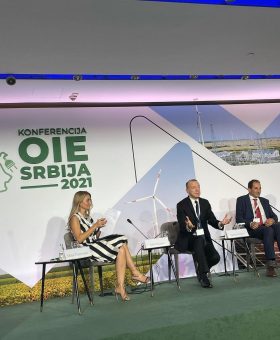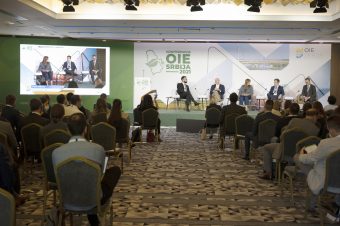
The first conference dedicated to green energy, “RES Serbia 2021”, organized by the Renewable Energy Sources of Serbia Association, supported by the European Bank for Reconstruction and Development (EBRD), was held on September 15 at Metropol Palace Hotel in Belgrade. In the welcoming speech, the participants were addressed by Zorana Mihajlović, Minister of Mining and Energy, and Grzegorz Zieliński, Director of EBRD’s Energy Europe team.
“Emissions of harmful gases must be cut in half in the next decade. By 2050, fossil fuels must be phased out to meet the goals set by the Paris Agreement. Huge, multi-billion investments will be needed, but the benefits of these investments will also be huge,” Zieliński said.
Minister of Mining and Energy, Zorana Mihajlović, pointed out that the energy transition process has been initiated through the legal framework.
“We have to be fast and efficient when it comes to decarbonization, regardless of the resistance we feel. If we do it slowly, step by step, and replace the dirty power plants that use the worst coal and have enough capacity to use renewable sources instead, we can become an important player on the market in this part of Europe. Our goal is to have at least 40 percent of the energy obtained from RES by 2040 and more than 50 percent by 2050. We also expect that emissions of harmful gases in the next ten years will catch up with the EU median. We are facing serious challenges, but we are doing everything together with local governments, industry, and people, which is validated through projects aimed to increase energy efficiency and use of solar panels,” stated Ms Mihajlović, announcing that the first biddings will be held in December.
Energy transition depends on regional cooperation
Energy transition and decarbonization, production of electricity from coal, and emissions of harmful gases exceeding those in the European Union were the topics discussed at the first panel, moderated by Maja Pokrovac from RES Croatia. According to Janez Kopač, Director of the Energy Community Secretariat, it is necessary to tax carbon dioxide (CO2 ) emissions to have a permanent source of funds. However, he is aware that this will be a significant social problem that needs to be solved as soon as possible.
“The fact that the European Union expects the Balkans to keep the same pace of transition, and we have to be aware that help is needed since the budgetary capacities are not the same. To achieve the target, emissions must be taxed and those funds, along with local incentives, should be used for the transition”, Kopač explained. Exchange of experiences and regional projects are essential in this transition process. Jovanka Atanacković, State Secretary at the Ministry of Mining and Energy, explained that good examples from the region have helped Serbia create new laws “All bylaws will be passed by the end of October. By the end of February 2022, we will have a three-year plan for auctions, and they will be electronic thanks to the software we are working on,” Atanacković pointed out. Viktor Andonov, Advisor to the Prime Minister of North Macedonia, and WindEurope CEO Giles Dickson visiting Serbia for the first time, also spoke at the panel.

Challenges and obstacles in the development and construction of RES projects
According to the data available, in 2020, renewable energy sources in the European Union generated more electricity than fossil fuels. Emanuel Van Vyve, Business Development Director of Elicio, Marko Liposcak, Business Development Director of Enlight, Bonnie Norman, President at E3 International and Aleksandar Jakovljević, Strategic Director of EPS Serbia, talked about the present position of Serbia and goals achieved.
As Emanuel Van Vyve pointed out, investors are faced with a highly complex process of obtaining construction permits for wind farms and strict requirements when obtaining work permits. He sincerely hopes that this system will be improved soon.
Marko Liposcak, the director of business development at the Israeli company Enlight, explained that the Kovačica wind farm is a pioneering endeavour in our country and that will be expanded soon, while the procedure for obtaining permits for the Pupin project is in progress. “Previous experiences have helped us in the process of obtaining permits, which shows that we have seen some progress in that respect, and we are optimistic when it comes to the development of RES projects in Serbia. Placing energy in the grid is a new challenge for us at the moment.”
According to Aleksandar Jakovljević, the transition to renewable energy sources in Serbia is realistic and sustainable and clearly defines our role in the process of decarbonization and transition.
“Increasing renewable energy sources is absolutely necessary. A balance must be created along with a process that could be sustainable for everyone”, says Jakovljević.
Prepared by: Milica Radičević
Read the story in the new issue of the Energy portal Magazine RECYCLING.


